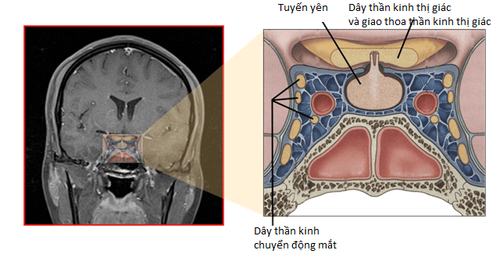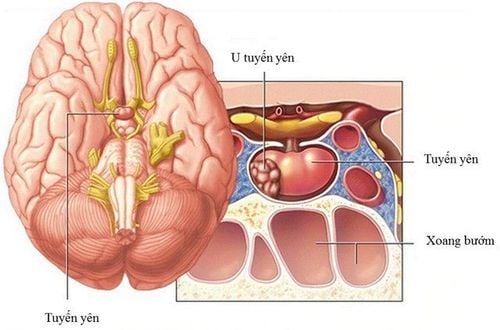This is an automatically translated article.
A pituitary tumor is an abnormal neoplasm arising from the pituitary gland, a part of the brain responsible for regulating the body's hormonal balance. When left untreated the disease can cause many problems such as vision loss, permanent hormone deficiency...1. Learn about pituitary tumors
A pituitary tumor is an abnormal growth of a tumor in the pituitary gland. A part of the brain responsible for regulating the balance of hormones (hormones) of the body. But the very appearance of a pituitary tumor can lead to the overproduction of hormones that control the body's functions. Or conversely, some pituitary tumors appear, causing the production of hormones to be less, resulting in the body not having enough of the necessary hormones.2. Why does pituitary tumor affect the ability of eyes to see?
Pituitary tumors can cause visual disturbances because the pituitary gland itself is located close to important visual brain structures, including:The optic nerve and the optic nerve junction. Nerves help the eyes move properly. The pituitary gland is a small, bean-shaped gland, about the size of a pea, located at the base of the brain, about behind the nose and between the ears. The pituitary gland is located in the pituitary fossa, measuring only a few centimeters behind the eyes.

Bệnh u tuyến yên ảnh hưởng nhiều đến khả năng nhìn của mắt
Occasionally, a pituitary tumor that grows larger than 1cm (macroadenomas) can compress the optic nerve in one eye and cause vision loss in that eye. In other cases, when the pituitary tumor grows and affects the optic nerve intersection, it will cause loss of vision in both eyes.
3. Vision symptoms caused by pituitary gland tumors
Depending on the size of the pituitary tumor and the degree of compression to the optic nerve and optic nerve, visual symptoms may include:Blurry vision (in one or both eyes) Loss of vision Peripheral Dual Vision Loss of vision in one or both eyes If the pituitary tumor progresses gradually, visual symptoms are often difficult to recognize. Patients with small pituitary tumors (microadenomas) usually do not have typical visual symptoms. However, if the pituitary tumor is larger, called macroadenomas (usually larger than 1cm), the patient can have significant symptoms, which range from blurred vision to loss of vision in one or even both eyes.

U tuyến yên có những triệu chứng như thế nào?
Another important symptom that can occur with a pituitary tumor is that sometimes a person sees two images instead of one. This happens because a pituitary tumor can put pressure on the nerve that helps with eye movement. When the eyes are not in the right line, we will see a double image.
Magnetic resonance imaging (MRI) can detect pituitary tumors and show whether the tumor is pressing on the optic nerve or at the optic nerve junction.
4. Lifestyle habits to help limit the progression of pituitary tumors
The following living habits and lifestyles will help limit the progression of pituitary tumors:Follow up with scheduled appointments to monitor the progress of symptoms as well as health status. Take medicine under the guidance of a doctor, do not arbitrarily take drugs that are not prescribed or arbitrarily quit prescribed drugs. Tell your doctor about all other medical conditions. Tell your doctor about any medications you are taking, including prescription and nonprescription drugs. Tell your doctor if you are pregnant or plan to become pregnant. See a doctor right away or go to the emergency room if you have a fever, stiff neck, sudden headache, or vision changes.

Khám u tuyến yên tại Bệnh viện Đa khoa Quốc tế Vinmec
Please dial HOTLINE for more information or register for an appointment HERE. Download MyVinmec app to make appointments faster and to manage your bookings easily.













